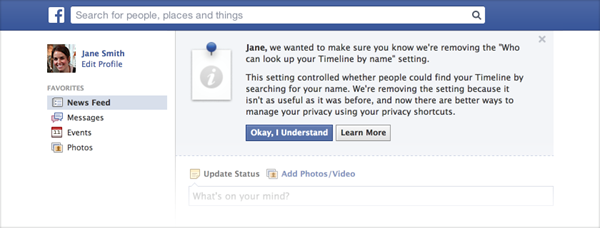You’ll Need To Change Your Settings To Avoid Showing Up In Facebook Search
Facebook announced last night that it’s pulling the plug on this setting, which it claims fewer than 1% of users were taking advantage of.
The company says that the old setting was inadequate as “it didn’t prevent people from navigating to your Timeline by clicking your name in a story in News Feed, or from a mutual friend’s Timeline.”
Users with this old setting still turned on will eventually receive a notification like the one seen above. After that, the old setting is turned off and the user will need to review his or her current settings to see if they are still relatively hidden (inasmuch as one can be hidden on a site intended for public sharing).
ReadWrite’s Selena Larson details the various tweaks one can make to their Facebook settings, but here are the basics:
PRIVACY SETTINGS
Here you can select how public your posts are, who can contact you, and whether you show up in search results both on and off of Facebook.
ACTIVITY LOG
This can be accessed in a few ways, including through the Privacy Settings page. It allows you to select the audience (if any) for individual items on your Timeline. So if you made an embarrassing comment several years ago, here’s your opportunity to hide it.
TIMELINE AND TAG SETTINGS
This is where you determine which users can actually post things on your Timeline and gives you some control over tagging of posts and photos.
Want more consumer news? Visit our parent organization, Consumer Reports, for the latest on scams, recalls, and other consumer issues.


